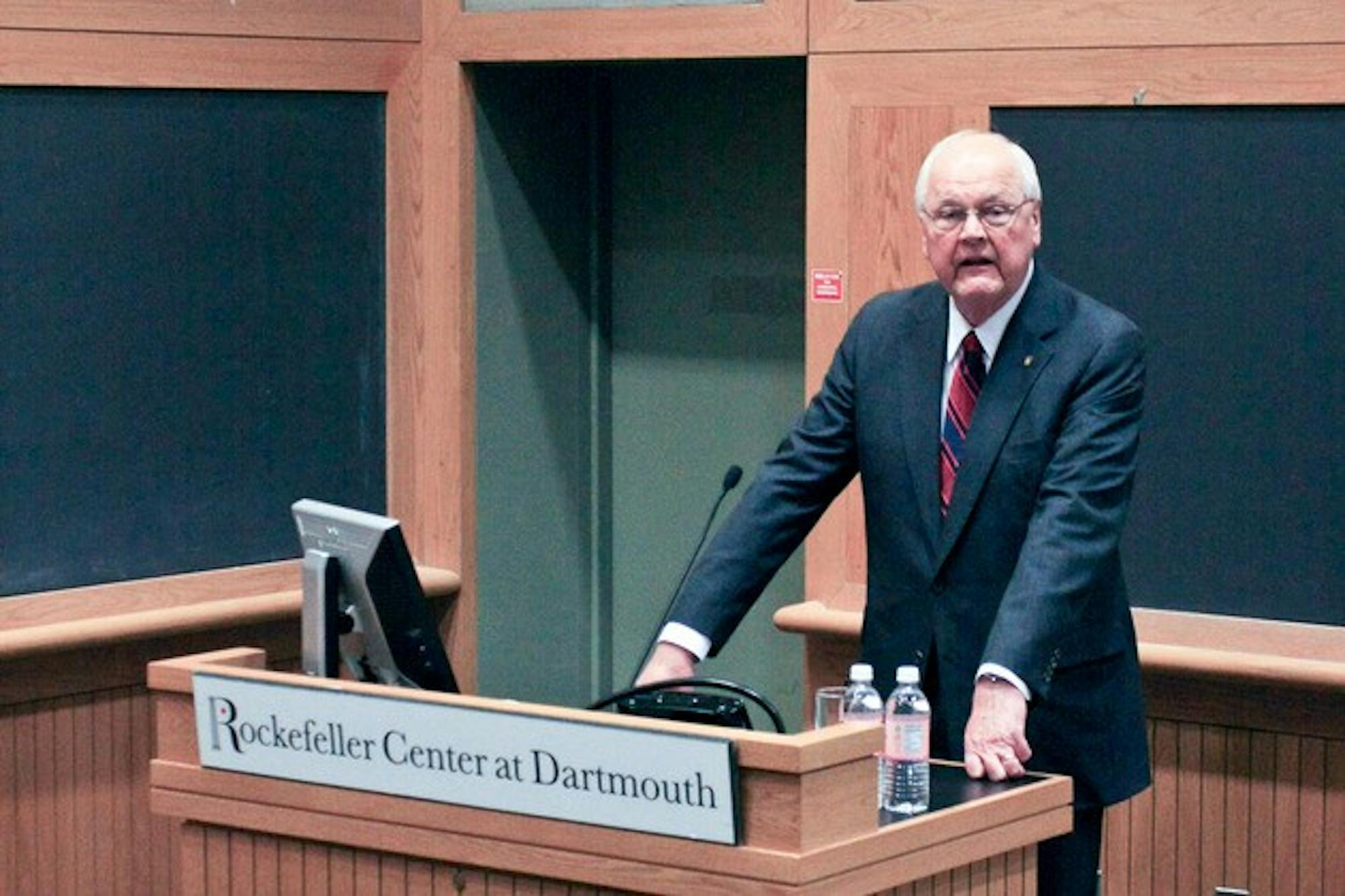"There is little doubt that Americans are interested in doing the right thing for veterans, but they don't know what the right thing might be because few are touched by these wars," Wright, a former Marine, said in the Rockefeller Center.
Since 2005, Wright has visited medical facilities in Washington, D.C., to encourage injured veterans to pursue their education and to raise funds for counseling programs geared toward veterans, economics professor and Rockefeller Center Director Andrew Samwick said as he introduced Wright.
In his lecture, Wright a former history professor at the College encouraged audience members to remember war's "human quality" as he reflected on the role of war throughout United States history.
"Today I'm honored to speak here, at home, to share comments on my work over the past six years and step back as a historian to reflect upon the way Americans have thought about and mobilized for war and the attitudes we have had towards those who have fought our wars," he said.
Wright discussed the many hardships faced by veterans seeking to assimilate to civilian life upon returning from active duty.
"Un-learning what one has just done may not be possible for anyone who has encountered the horror of war," Wright said. "This is a major burden we place upon those who serve in our wars."
Although public rhetoric often idealizes veterans as "heroes," society fails to provide veterans with the resources they need to resume civilian lives, Wright said. Veterans confined to wheelchairs, for example, are applauded as "rockstars" at baseball games or other public events, but those superficial forms of adulation do not represent a true long-term commitment to addressing their needs as war survivors, Wright said.
Although medical advancements have allowed hospitals to provide for seriously injured veterans and to save countless lives, better counseling programs are needed to properly care for veterans who require physical and psychological assistance, Wright said.
"We need job counseling, training, vocational rehabilitation programs, to encourage them to dream for more and enable them to reach those dreams," he said.
In outlining the history of American views toward soldiers and veterans, Wright explained that Americans have typically conceptualized soldiers as citizens fulfilling a "democratic obligation" rather than militaristic individuals.
The idea of the "willing volunteer" or the "citizen soldier" is very misleading, Wright said.
"This narrative contains some errors," he said. "Most importantly, with the exception of World War II, there has historically not been the massive enthusiasm for volunteering for war that the story implies."
Wright also discussed the evolution of the military draft, which he defined as an important yet controversial aspect of U.S. military history. The draft enlisting soldiers for World War II was a "fair and comprehensive system" that allowed for few exceptions or deferments and avoided socioeconomic bias, Wright said.
The Korean War and Vietnam War drafts which allowed educational deferments shifted away from this model and led to the creation of a combat force that no longer represented a "cross-section" of American society, he said.
While the current system successfully staffs military positions without compulsory military service, citizens from rural districts and white and black citizens are overrepresented compared to Asians, Hispanics and other minority groups, according to Wright.
Wright cited several statistics regarding the numbers of U.S. veterans and the numbers of casualties resulting from previous military engagements before warning listeners not to rely on numbers to understand the true impact of war.
"Numbers that are aggregated manage to rob war of its essential component, that is individuals who are exposed to risks and asked to do sometimes horrible things," Wright said.
Americans should never allow war "not to have a human face," he said.
Sarah Knapp '14 said Wright's presentation was powerful and moving.
"I think the lecture was a great way to take a step back on Veterans Day and remember why we have our freedoms and what we are honoring," Knapp said.
For the first time in several years, the College came together as a community to recognize Veterans Day through institution-wide events, according to Kerry Jones, co-chair of the College's Veterans' Recognition Committee and director of workforce planning and organizational effectiveness in the Office of Human Resources. Executive Vice President and Chief Financial Officer Steven Kadish also co-chaired the committee.
The events began Friday morning with a Veterans Day remembrance breakfast in Collis Common Ground open to veterans and their families, as well as faculty members and staff who wished to recognize veterans' service, according to Jones. Wright attended the event and delivered a speech, Jones said.
"I thought it was a great success and we received positive feedback throughout the event," she said. "It was very well-attended. We had reservations for the first 100 and went over by about 20."
Dartmouth's Reserve Officers' Training Corps led a Retreat ceremony which marks the "retiring of the flag at the end of the day" on the Green at 5 p.m. The College's marching band and the Dartmouth Wind Symphony performed ceremonial music to accompany the event, which approximately 40 individuals attended.
Other Veterans Day events included a moment of silence at 11:00 a.m. and a slideshow in Baker Library featuring stories of Dartmouth veterans, according to the College's website.
The College will model future Veterans Day celebrations on this year's schedule since the events exceeded the planning committee's expectations, Jones said.
"I think it is a great way for the institution to work toward their diversity and inclusion initiative by including veterans, and we're moving in the right direction on these sorts of initiatives," she said.




